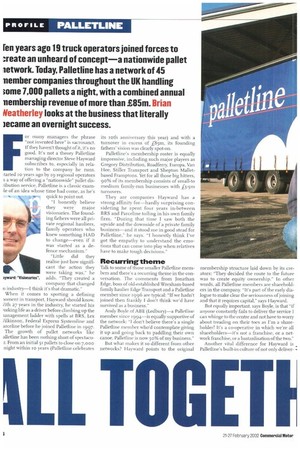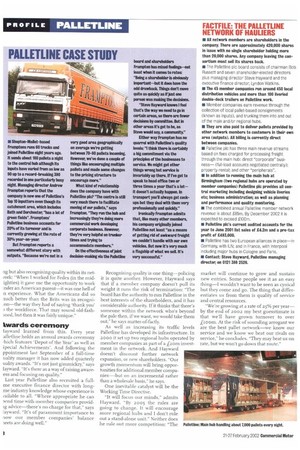PROFILE
Page 36

Page 38

If you've noticed an error in this article please click here to report it so we can fix it.
PALLETLINE
Fen years ago 19 truck operators joined forces to :reate an unheard of concept—a nationwide pallet network. Today, Palletline has a network of 45 nember companies throughout the UK handling ;ome 7,000 pallets a night, with a combined annual nembership revenue of more than £05m. Brian Weatherley looks at the business that literally necame an overnight success.
IF, or many managers the phrase "not invented here" is sacrosanct. If they haven't thought of it, it's no good. It's not a theory Palletline managing director Steve Hayward subscribes to, especially in relation to the company he runs. .tarted ro years ago by 19 regional operators s a way of offering a "nationwide" pallet disribution service, Palletline is a classic examde of an idea whose time had come, as he's
quick to point out.
"I honestly believe they were major visionaries. The founding fathers were all private regional hauliers, family operators who knew something HAD to change—even if it was started as a defence mechanism."
"Little did they realise just how significant the action they were taking was," he ayward: "Visionaries". adds. "They created a company that changed
n industry—I think it's that dramatic." When it comes to spotting a defining
ioment in transport, Hayward should know. Jith 27 years in the industry, he started his rorking life as a driver before climbing up the ianagement ladder with spells at BRS, Lex iilkinson, Federal Express Systemline and arcane before he joined Palletline in 1997.
The growth of pallet networks like alletline has been nothing short of spectacur. From an initial 51 pallets to dose on 7,000 night within TO years (Palletline celebrates
its Toth anniversary this year) and with a turnover in excess of £85m, its founding fathers' vision was clearly spot-on.
Palletline's membership roster is equally impressive, including such major players as Gregory Distribution, Roadferry, Europa, Van Hee, Stiller Transport and Shepton Malletbased Framptons. Yet for all those big hitters, 9 o% of its membership consists of small-to medium family-run businesses with f3-5m turnovers.
They are companies Hayward has a strong affinity for—hardly surprising considering he spent four years in-between BRS and Parceline toiling in his own family firm. "During that time I saw both the upside and the downside of a private family business—and it stood me in good stead for Palletline," he says. "I honestly think I've got the empathy to understand the emotions that can come into play when relatives have to make tough decisions."
Recurring theme
Talk to some of those smaller Palletline members and there's a recurring theme in the conversation. The comments from Jonathan Edge, boss of old-established Wrexham-based family haulier Edge Transport and a Palletline member since 1996 are typical: If we hadn't joined then frankly I don't think we'd have survived as a business."
Andy Boyle of ABE (Ledbury)—a Palletline member since 1994—is equally supportive of the network: "I don't believe there's a single Palletline member who'd contemplate giving it up and going back to paddling their own canoe. Palletline is now 50% of my business."
But what makes it so different from other networks? Hayward points to the original membership structure laid down by its creators: "They decided the route to the future was to create equity ownership." In other words, all Palletline members are shareholders in the company. "It's part of the early dialogue to make clear the seriousness of joining and that it requires capital," says Hayward.
But equally important, says Boyle, is that "if anyone constantly fails to deliver the service can whinge to the centre and not have to worry about treading on their toes as I'm a shareholder! It's a co-operative in which we're all shareholders—it's not a franchise, or a network franchise, or a bastardisation of the two."
Another vital difference for Hayward is Palletline's built-in culture of not only deliver
rig but also recognising qualit y within its netvork: "When I worked for Fedex (in the midighties) it gave me the opportunity to work inder an American parent—it was one hell of n experience. What the Americans did so nuch better than the Brits was in recogni.on—the way they had of saying 'thank you' 3 the workforce. That may sound old-fash)ned, but then it was fairly unique."
%wards ceremony
lay-ward learned from this. Every year alletline holds an annual awards ceremony thich features 'Depot of the Year' as well as ipecial Achievements'. And following the ppointment last September of a full-time uality manager it has now added quarterly uality awards. "It's not just gimmickry," says layward. "It's there as a way of raising awareess and focusing on quality."
Last year Palletline also recruited a fullme executive finance director with longme industry knowledge whose experience is vailable to all. "Where appropriate he can mend time with member companies providig advice—there's no charge for that," says [ayward. "It's of paramount importance to now our member companies' balance meets are doing well. Recognising quality is one thing—policing it is quite another. However, Hayward says that if a member company doesn't pull its weight it runs the risk of termination: "The board has the authority to run Palletline in the best interests of the shareholders, and it has considerable authority. If it thinks that there's someone within the network who's beyond the pale then, if we want, we would take them out," he says matter-of-factly.
nies -but on an incremental rather than a wholesale basis," he says.
One inevitable catalyst will be the Working Time Directive.
"It will focus our minds," admits Hayward. "By 2005 the rules are going to change. It will encourage more regional hubs and I don't rule out a stand-alone unit." Neither does he rule out more competition: "The market will continue to grow and sustain new entries. Some people see it as ark easy thing—I wouldn't want to be seen as cynical but they come and go. The thing that differentiates us from them is quality of service and central resources.
"We're growing at a rate of 25% per year— by the end of 2002 my best guesstimate is that we'll have grown turnover to over LB) om. At the risk of sounding arrogant we are the best pallet network—we know our service and we know we beat our rivals on service," he concludes. "They may beat us on rate, but we won't go down that route."






















































































































































